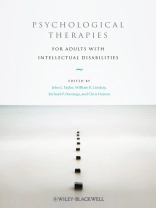Psychological Therapies for Adults with Intellectual Disabilities brings together contributions from leading proponents of psychological therapies for people with intellectual disabilities, which offer key information on the nature and prevalence of psychological and mental health problems, the delivery of treatment approaches, and the effectiveness of treatment.
- Offers a detailed guide to available therapies for adults with intellectual disabilities
- Includes case illustrations to demonstrate therapies in action
- Provides up-to-date coverage of current research in the field
- Puts forward a consideration of the wider contexts for psychological therapy including the relationship with social deprivation, general health, and the cost effectiveness of treatment
- Places individual interventions in the context of the person’s immediate social network including families and carers
- Includes contributions from leading proponents from around the world
Inhoudsopgave
About the Editors vii
List of Contributors ix
Foreword xiii
Preface xvii
1 Mental Health and Emotional Problems in People with Intellectual Disabilities 1
John L. Taylor and Martin Knapp
2 Social and Psychological Factors as Determinants of Emotional and Behavioral Difficulties 15
Eric Emerson and Andrew J. Jahoda
3 The Assessment of Mental Health Problems in Adults with Intellectual Disabilities 31
Chris Hatton and John L. Taylor
4 Preparing People with Intellectual Disabilities for Psychological Treatment 55
Dave Dagnan, Andrew J. Jahoda and Amy Kilbane
5 Adapting Psychological Therapies for People with Intellectual Disabilities I: Assessment and Cognitive Deficit Considerations 69
William R. Lindsay, Andrew J. Jahoda, Paul Willner and John L. Taylor
6 Adapting Psychological Therapies for People with Intellectual Disabilities II: Treatment Approaches and Modifications 85
William R. Lindsay, Andrew J. Jahoda and Paul Willner
7 Cognitive–Behavioral Therapy for Anxiety Disorders 101
William R. Lindsay, Paul Willner and Peter Sturmey
8 Cognitive–Behavioral Therapy for Mood Disorders 117
Anna J. Esbensen and Sigan L. Hartley
9 Anger Control Problems 133
John L. Taylor and Raymond W. Novaco
10 Cognitive–Behavioral Therapy for People with Intellectual Disabilities and Psychosis 157
Stephen C. Oathamshaw, Alastair L. Barrowcliff and Gillian Haddock
11 Cognitive–Behavioral Treatment for Inappropriate Sexual Behavior in Men with Intellectual Disabilities 173
William R. Lindsay
12 Developing Psychotherapeutic Interventions for People with Autism Spectrum Disorders 193
Dougal Julian Hare
13 Supporting Care Staff Using Mindfulness- and Acceptance-Based Approaches 207
Stephen J. Noone
14 Behavioral Approaches to Working with Mental Health Problems 223
Robert S.P. Jones and Alan Dowey
15 Psychodynamic Psychotherapy and People with Intellectual Disabilities 237
Nigel Beail and Tom Jackson
16 Mindfulness-Based Approaches 253
Nirbhay N. Singh, Giulio E. Lancioni, Alan S.W. Winton, Angela D.A. Singh, Ashvind N.A. Singh and Judy Singh
17 Psychological Therapies for Adults with Intellectual Disabilities: Future Directions for Research and Practice 267
Richard P. Hastings, Chris Hatton, William R. Lindsay and John L. Taylor
Index 277
Over de auteur
John L Taylor is Professor of Clinical Psychology, Northumbria University and Consultant Clinical Psychologist and Psychological Services Professional Lead with Northumberland, Tyne & Wear NHS Foundation Trust. He is a Past President of the British Association for Behavioural & Cognitive Psychotherapies (BABCP).
Bill Lindsay is Consultant Psychologist and Lead Clinician in Scotland for Castlebeck Care. He was previously Head of Psychology (LD) in NHS Tayside and a Consultant Clinical Psychologist with the State Hospital, Carstairs. He is Professor of Learning Disabilities and Forensic Psychology at the University of Abertay, Dundee, and Honorary Professor with the School of Psychology, Bangor University.
Richard Hastings is Professor of Psychology at Bangor University and Research Director for the North Wales Clinical Psychology Programme. He has published widely in the field of intellectual disability, and is currently an associate editor for five international journals and on the editorial board member for a further nine.
Chris Hatton is Professor of Psychology, Health and Social Care at Lancaster University. His research interests centre on policy-relevant research concerning people with intellectual disabilities, particularly around evaluating innovations in health and social care and understanding inequalities in the physical and mental health of people with intellectual disabilities.












